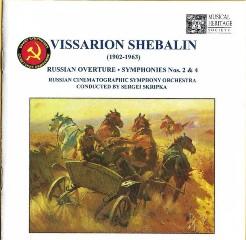Vissarion Shebalin - Russian Overture. Symphonies Nos. 2 & 4 (1999)
Vissarion Shebalin - Russian Overture. Symphonies Nos. 2 & 4 (1999)

1 Russian Overture In E Minor, Op. 31 (1941) 11:37 Symphony No. 2 In C Sharp Minor, Op. 11 (1929) (21:52) 2 I. Andante. Allegro 10:03 3 II. Allegro assai 11:47 Symphony No. 4 In B Flat Major, Op. 24 (1935, Rev. 1961), "The Heroes Of Perekop" (25:00) 4 I. Andante. Allegro 12:35 5 II. Allegro molto 12:21 Russian Cinematographic Orchestra Sergei Skripka - conductor
As I hoped, Olympia’s disc of Shebalin’s First and Third Symphonies (4/96) now has a sequel, and a very welcome one it is. I gave a thumbnail sketch of Shebalin’s qualities in my previous review, and the main works on the new disc confirm his status as a serious-minded but problematic symphonist.
The key of C sharp minor is rare for a symphony, and the material of Shebalin’s Second is correspondingly recherche. Volatile and unsettled, the structure seems determined to strangle its own urges for symphonic expansion, bringing to mind the most radical manner of Shebalin’s teacher Miaskovsky (the latter’s near-contemporary Tenth and Thirteenth Symphonies, for instance). Both movements are troubled and introspective. I find myself admiring their disdain for the easy way out but wondering how they managed to get themselves into such a tangle in the first place. As a musical experience the Second Symphony is more stimulating than satisfying, but it certainly adds to our picture of where the Soviet symphony was at in 1929, just as the Proletarian faction in Soviet music was starting to make life seriously awkward for symphonists. The Fourth Symphony shows the signs of its times even more clearly. It dates from 1935, the year after Socialist Realism had first been trumpeted in the Soviet Writers’ Union. Like so many works around that time it is dedicated to a heroic Soviet achievement, in this case a Civil War victory of the Reds over the Whites in 1920. Not surprisingly the style is broader and more relaxed than that of the Second Symphony, yet still recognizably Shebalin’s own in its occasional wilful contortions. In the first movement the revolutionary funeral song, You fell as a victim, makes its predictable appearance (it can be heard in dozens of Soviet film scores as well as in the slow movement of Shostakovich’s Eleventh Symphony), and the second movement balances it with an energetic tune which I believe is Shebalin’s own The Third Crimean Division. The outcome is an all-purpose-Soviet-triumphal march.
The Russian Overture dates from 1941 and is presumably an immediate patriotic reaction to the Nazi insurgency. Heroic intonations abound, but Shebalin does not lose sight of craftsmanly principles, at least not until his peremptory tokenist conclusion.
The performances here are no match for those conducted by Mark Ermler and Valery Gergiev on the previous disc. The strings of the Russian Cinematographic Symphony Orchestra sound thinnish and the recording itself is ‘first desk-y’. Nevertheless, collectors interested in Soviet music and/or the twentieth-century symphony will be thanking Olympia for yet again spotting and plugging a significant gap in the catalogue.' ---gramophone.co.uk
download (mp3 @320 kbs):
yandex mediafire ulozto gett bayfiles








